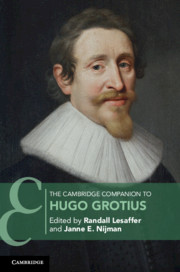Book contents
- The Cambridge Companion to Hugo Grotius
- Cambridge Companions to Law
- The Cambridge Companion to Hugo Grotius
- Copyright page
- Contents
- Contributors
- Preface
- Chronology
- Abbreviations and Short Titles of Works by Grotius
- Editions and Translations of Grotius’ Work
- Introduction
- Part I Grotius in Context
- Part II Concepts
- Part III Grotius as a Man of Letters, Theologian and Political Writer
- Part IV Grotius as a Legal Scholar
- Part V The Reception of Grotius
- Index
- References
Part IV - Grotius as a Legal Scholar
Published online by Cambridge University Press: 03 September 2021
- The Cambridge Companion to Hugo Grotius
- Cambridge Companions to Law
- The Cambridge Companion to Hugo Grotius
- Copyright page
- Contents
- Contributors
- Preface
- Chronology
- Abbreviations and Short Titles of Works by Grotius
- Editions and Translations of Grotius’ Work
- Introduction
- Part I Grotius in Context
- Part II Concepts
- Part III Grotius as a Man of Letters, Theologian and Political Writer
- Part IV Grotius as a Legal Scholar
- Part V The Reception of Grotius
- Index
- References
Summary

- Type
- Chapter
- Information
- The Cambridge Companion to Hugo Grotius , pp. 385 - 556Publisher: Cambridge University PressPrint publication year: 2021

